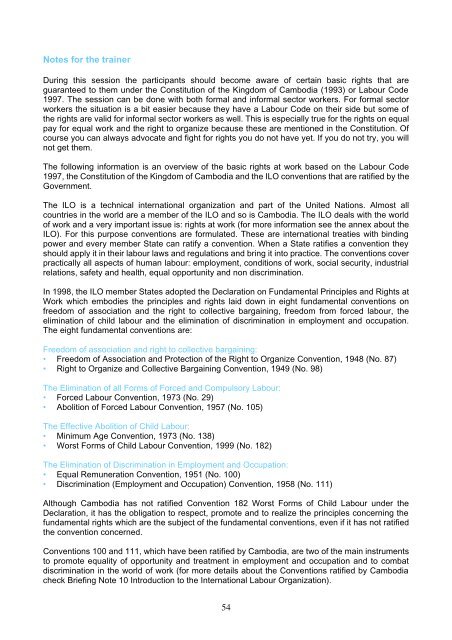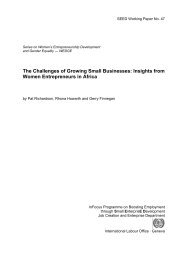manual: women workers' rights and gender equality - International ...
manual: women workers' rights and gender equality - International ...
manual: women workers' rights and gender equality - International ...
You also want an ePaper? Increase the reach of your titles
YUMPU automatically turns print PDFs into web optimized ePapers that Google loves.
Notes for the trainer<br />
During this session the participants should become aware of certain basic <strong>rights</strong> that are<br />
guaranteed to them under the Constitution of the Kingdom of Cambodia (1993) or Labour Code<br />
1997. The session can be done with both formal <strong>and</strong> informal sector workers. For formal sector<br />
workers the situation is a bit easier because they have a Labour Code on their side but some of<br />
the <strong>rights</strong> are valid for informal sector workers as well. This is especially true for the <strong>rights</strong> on equal<br />
pay for equal work <strong>and</strong> the right to organize because these are mentioned in the Constitution. Of<br />
course you can always advocate <strong>and</strong> fight for <strong>rights</strong> you do not have yet. If you do not try, you will<br />
not get them.<br />
The following information is an overview of the basic <strong>rights</strong> at work based on the Labour Code<br />
1997, the Constitution of the Kingdom of Cambodia <strong>and</strong> the ILO conventions that are ratified by the<br />
Government.<br />
The ILO is a technical international organization <strong>and</strong> part of the United Nations. Almost all<br />
countries in the world are a member of the ILO <strong>and</strong> so is Cambodia. The ILO deals with the world<br />
of work <strong>and</strong> a very important issue is: <strong>rights</strong> at work (for more information see the annex about the<br />
ILO). For this purpose conventions are formulated. These are international treaties with binding<br />
power <strong>and</strong> every member State can ratify a convention. When a State ratifies a convention they<br />
should apply it in their labour laws <strong>and</strong> regulations <strong>and</strong> bring it into practice. The conventions cover<br />
practically all aspects of human labour: employment, conditions of work, social security, industrial<br />
relations, safety <strong>and</strong> health, equal opportunity <strong>and</strong> non discrimination.<br />
In 1998, the ILO member States adopted the Declaration on Fundamental Principles <strong>and</strong> Rights at<br />
Work which embodies the principles <strong>and</strong> <strong>rights</strong> laid down in eight fundamental conventions on<br />
freedom of association <strong>and</strong> the right to collective bargaining, freedom from forced labour, the<br />
elimination of child labour <strong>and</strong> the elimination of discrimination in employment <strong>and</strong> occupation.<br />
The eight fundamental conventions are:<br />
Freedom of association <strong>and</strong> right to collective bargaining:<br />
• Freedom of Association <strong>and</strong> Protection of the Right to Organize Convention, 1948 (No. 87)<br />
• Right to Organize <strong>and</strong> Collective Bargaining Convention, 1949 (No. 98)<br />
The Elimination of all Forms of Forced <strong>and</strong> Compulsory Labour:<br />
• Forced Labour Convention, 1973 (No. 29)<br />
• Abolition of Forced Labour Convention, 1957 (No. 105)<br />
The Effective Abolition of Child Labour:<br />
• Minimum Age Convention, 1973 (No. 138)<br />
• Worst Forms of Child Labour Convention, 1999 (No. 182)<br />
The Elimination of Discrimination in Employment <strong>and</strong> Occupation:<br />
• Equal Remuneration Convention, 1951 (No. 100)<br />
• Discrimination (Employment <strong>and</strong> Occupation) Convention, 1958 (No. 111)<br />
Although Cambodia has not ratified Convention 182 Worst Forms of Child Labour under the<br />
Declaration, it has the obligation to respect, promote <strong>and</strong> to realize the principles concerning the<br />
fundamental <strong>rights</strong> which are the subject of the fundamental conventions, even if it has not ratified<br />
the convention concerned.<br />
Conventions 100 <strong>and</strong> 111, which have been ratified by Cambodia, are two of the main instruments<br />
to promote <strong>equality</strong> of opportunity <strong>and</strong> treatment in employment <strong>and</strong> occupation <strong>and</strong> to combat<br />
discrimination in the world of work (for more details about the Conventions ratified by Cambodia<br />
check Briefing Note 10 Introduction to the <strong>International</strong> Labour Organization).<br />
54

















